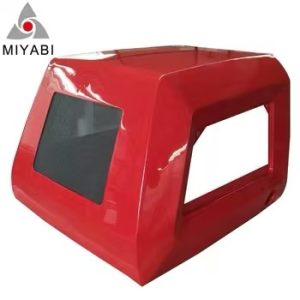Glass fiber reinforced plastic (also known as glass fiber reinforced plastic, referred to as FRP) is a lightweight high-strength material composed of glass fiber and resin materials, which is widely used in agricultural machinery shell, automobile, ship and other fields. In agricultural machinery, FRP is used as a housing material to achieve advantages such as weight reduction, increased durability and improved corrosion resistance. The following is a durability analysis of FRP farm machinery housing, including its advantages, possible disadvantages, and the key factors affecting durability.
1.The advantages of FRP agricultural machinery shell
- 1.1 Corrosion Resistance
FRP has very good corrosion resistance. Farm machinery is often exposed to a variety of harsh environments, such as humidity, heat, chemicals, fertilizers and pesticides. FRP has excellent chemical corrosion resistance, which can effectively resist the erosion of these environmental factors and extend the service life of agricultural machinery shell.
1.2 Light weight and high strength
The weight of FRP is relatively light, which can effectively reduce the overall weight of agricultural machinery and improve its fuel efficiency and operational efficiency. At the same time, the strength of FRP materials is high, has good impact resistance and compressive strength, and can withstand external shock, vibration and other loads to a certain extent.
1.3 Good formability
FRP material has good formability, can be molded, pultrusion, winding and other processes to form a variety of complex shapes of the shell, to meet the design needs of different agricultural machinery. Compared with metal enclosures, FRP enclosures are designed to be more flexible and can be made into more aerodynamic shapes, further improving the efficiency of agricultural machinery.
1.4 Heat insulation
FRP has good heat insulation, which makes it have certain advantages in high temperature environment, especially in the summer high temperature or strong solar radiation environment, can effectively reduce the problem of thermal expansion and contraction of agricultural machinery housing, maintain its stability.
- Disadvantages of FRP agricultural machinery shell
2.1 UV resistance
Although FRP has good corrosion resistance in most environments, when it is exposed to ultraviolet (UV) radiation for a long time, the surface may be aging, fading, embrittlement and other problems. Long-term ultraviolet irradiation will cause the degradation of the molecular structure of the resin and reduce the mechanical strength of the shell. Therefore, FRP enclosures require appropriate UV protection, usually adding anti-UV agents to the resin or coating a protective layer to improve UV resistance.
2.2 Impact resistance problem
Although the strength of FRP is high, its toughness is poor compared with metal, especially in low temperature environment easy to crack. When the agricultural machinery shell is subjected to a large impact or impact, the FRP may crack or damage, especially in the collision, drop or excessive bending. Therefore, the weak parts of FRP need to be considered in the design, and it may be necessary to combine other materials or strengthen the composite structure.
2.3 Fatigue performance after long-term use
In the process of long-term use, especially in the environment of high-frequency vibration or stress change, there will be material fatigue phenomenon. The fatigue properties of the material may lead to the generation of micro-cracks, and the strength of the shell gradually decreases with the extension of the use time. Therefore, the service life of the FRP shell is largely related to the working load and the use environment.
2.4 Thermal expansibility
The coefficient of thermal expansion of FRP is large, and in the environment of large temperature difference, the shell may be deformed or cracked. Especially in areas where the temperature difference between winter and summer is large, the shell may be damaged or deformed at the joint due to thermal expansion and cold contraction.
- Factors affecting the durability of FRP agricultural machinery shell
3.1 Usage Environment
The durability of farm machinery enclosures is closely related to the environment in which they are used. Common environmental factors include:
Temperature change: Extreme high or low temperature environments can affect the physical properties of FRP, resulting in aging, cracking or loss of strength of the material.
Humidity: Excessive moisture or prolonged exposure to water may cause the FRP to absorb water and expand, which in turn affects the shape and strength of the shell.
Chemical corrosion: pesticides, fertilizers, salt spray and other chemicals may cause certain corrosion or degradation of FRP, especially in the case of long-term contact.
3.2 Construction Technology
The durability of FRP not only depends on the quality of the material itself, but also closely related to its production process. For example, the choice of resin, the way the glass fiber is laid, the curing process, etc., will affect its final strength, toughness and durability. Lower quality construction processes can lead to greater defects in FRP enclosures, which in turn affect durability.
3.3 Design and thickness
The design of the casing of the FRP farm machinery will also affect its durability. Reasonable structural design can improve the impact resistance and deformation resistance of the material. In addition, the thickness of the shell is also a key factor, and an appropriate increase in thickness can enhance the strength and fatigue resistance of FRP.
3.4 Routine Maintenance
The durability of FRP enclosures also depends to a large extent on daily maintenance. If the surface of the agricultural machinery shell cracks, scratches and other damage, should be repaired in time. Regular inspection and maintenance can effectively extend the service life of the shell.
Contact Us
E-mail:[email protected]
If you are interested in any of FRP products, please contact me by email and we will be happy to quote our lowest price as soon as we receive your detailed request.






